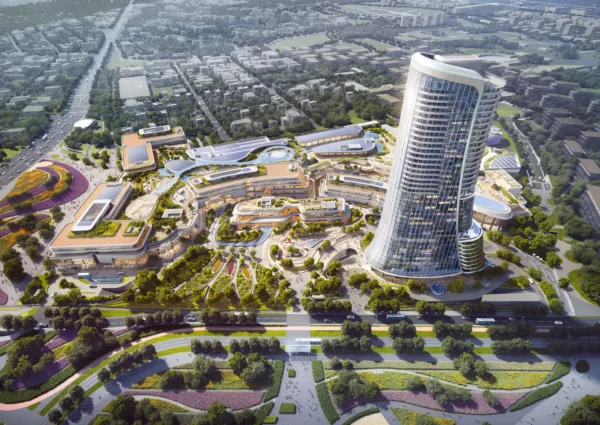
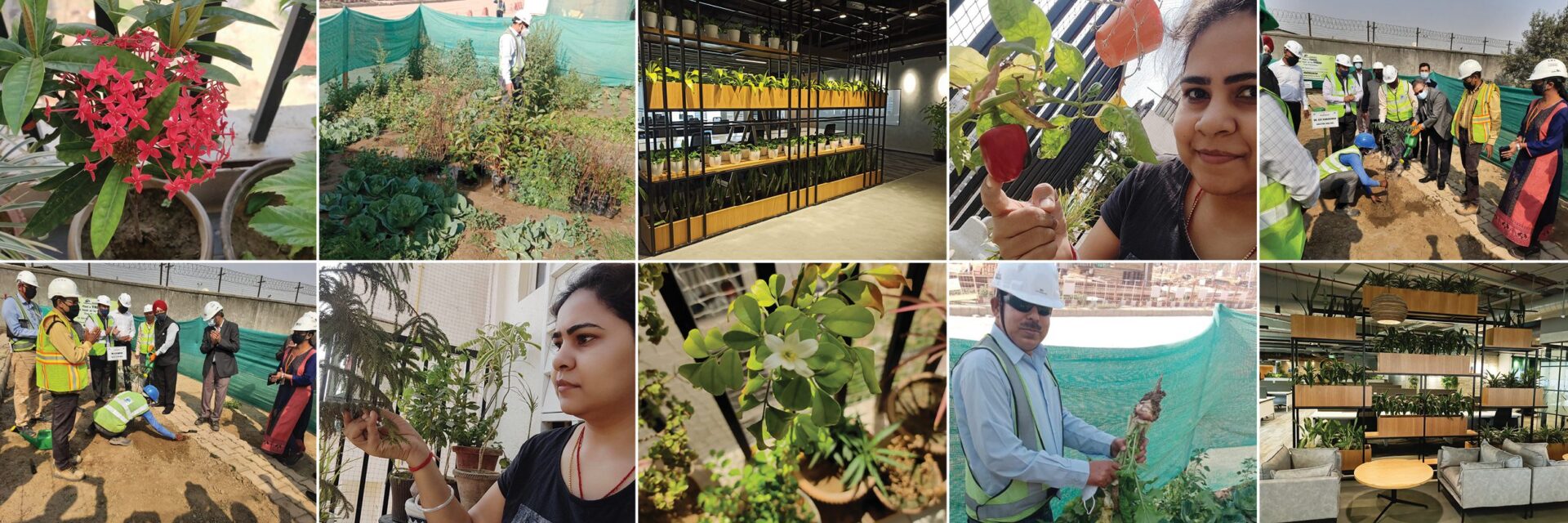
Amrita Pandey, Talent Acquisition Specialist with Hill International’s Cost Consultancy Organization, lives and works in Delhi, India. Amidst one of the world’s largest cities, Amrita tends to her home garden. This green space sits on her balcony, overlooking the cityscape, and features a rainbow of flowers and even some food items, like bell peppers. Urban gardening is an ancient practice, having been around since humans have known cities and agriculture, but it has become even more popular in recent years. For example, during the COVID-19 pandemic, research shows that interest in gardening blossomed around the world. For Amrita, this gardening craze is no wonder.
“I have been gardening for the last seven years,” Amrita says. “I do this because I love to be close to nature. It gives me happiness. I grew up in a small town where we had a big garden, and we used to sit there in the mornings and evenings. Coming to a big metropolis and living in high rise made me miss my garden a lot. To fill that void I created my own.”
Amrita adds that gardening time brings her joy and peace of mind. She explains, “My garden gives me immense motivation to blossom like my flowers and spread sweet fragrance and color into everyone’s lives, just as mother earth gives us so much.”
Hill Assistant General Manager – Project Startup & Coordination Surbhi Chawla is another nature lover. Like Amrita, cultivates a small garden at home in Gurgaon. “My family and I grow spinach, lettuce, tomatoes, garlic, turmeric, peppers, potatoes, okra, etc.,” she says. “It’s a very nice opportunity for family time. My husband and kids like to lend a hand, and the joy on kids’ faces when I ask them to pluck a ripe tomato or search for ripe potatoes is a treasure!”
Surbhi also strives to make her garden as environmentally friendly as possible by reusing old water tanks as soil beds, using only organic and natural fertilizer, and collecting her own seeds. To reduce food waste, Surbhi composts and uses food scraps to make bio-enzyme cleaning materials. “Even if I am tired, I always have the energy to tend to my plants and be with nature,” she adds. “All these things make me happy!”
Many gardeners know similar feelings. The connection between gardening and mental wellbeing is well established. In fact, according to Psychology Today, just being around a few houseplants can reduce stress and depression, strengthen memory, and boost productivity. Tending plants also provides moderate exercise, time in the sun, and cheap fruits and vegetables. Community gardens offer spaces for socializing and can help disseminate information about nutrition.
In addition to individual and community benefits, gardening can help make our planet healthier. On a widespread scale, gardening can promote sustainability by growing food closer to where it’s eaten, reducing the need for resource-intensive food transportation. It can create pockets of carbon storage, provide habitat space and food sources for native species, and offer opportunities for composting to reduce methane output. In places that suffer from frequent flooding, like Gurgaon, gardens can efficiently store water and help mitigate floods. The list goes on. Perhaps its most important benefit, gardening offers everyone—city dwellers particularly—an opportunity to connect with nature. This connection can prompt growth in how people think about the environment and the challenges it faces.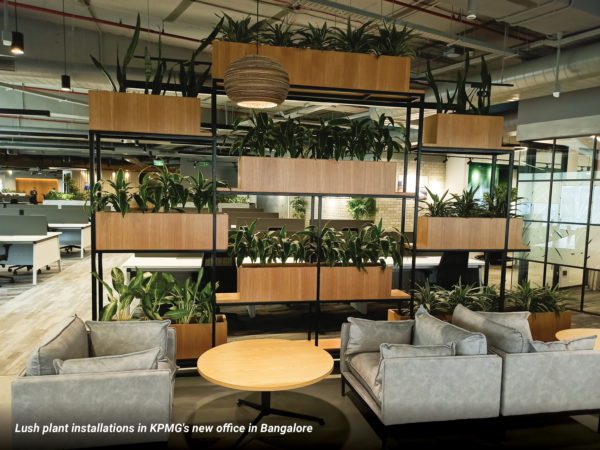
Gardens and other green spaces also play an important role in the built environment. According to Hill Assistant Cost Manager Manu S, KPMG Global Services Private Ltd. has installed plantings throughout its newly constructed office space in Bangalore to boost the project’s LEED score and drive sustainability. Hill’s Cost Consultancy Organization is providing a post-contract audit for the project. In Faridabad, the Indian Oil Corporation, Ltd. (IOCL) is dedicating a large swath of its new Technology Development and Deployment Centre (TDDC) to sustainable landscaping. “More than 30% of the campus will be filled with local plantings,” explains Hill Health, Safety, and Environment (HSE) Manager Tarique Anis. “This will help the TDDC meet the IOCL’s desired LEED and Green Rating for Integrated Habitat Assessment (GRIHA) ratings and become the world’s largest and most sustainable net-zero campus.” In addition to the green space that is formally part of the project, the Hill team providing project management services on the TDDC cultivates its own small garden.
Like Amrita and Surbhi, Tarique recognizes the power of the garden. He elaborates: “In our unique nursery, next to the HSE office on site, my colleagues and I enjoy tending to the plants and vegetables.” While the garden does not contribute directly to the project’s LEED/GRIHA scores, Tarique says it does symbolize Hill’s commitment to the IOCL’s ambitious green goals for the project. As Amrita, Surbhi, Tarique, and everyone else with a green thumb knows, gardening can be an incredibly healthy and fulfilling activity. Gardening is especially important in places like Los Angeles, Istanbul, and other major cities that only have a small percentage of their available land dedicated to green space. For the beginner gardener, especially in cities like these, it can be a challenge to be efficient with space usage. Many, like Amrita, use balconies. Even a small cluster of indoor plants can be a good way to start. In addition to space efficiency, gardeners should also consider the water and energy efficiency of their hobby by growing only native species, using hand-powered gardening equipment, and avoiding too much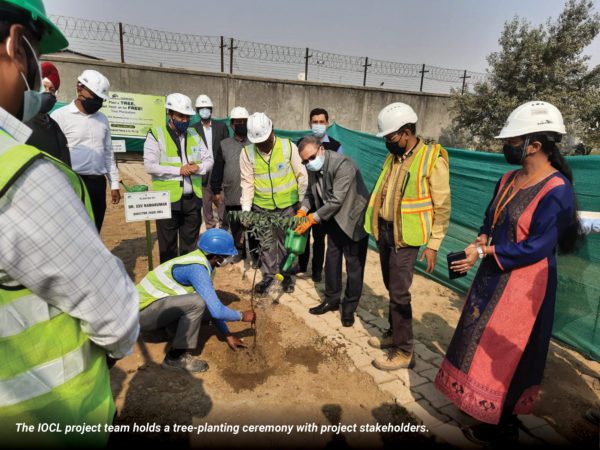 fertilizer.
fertilizer.
Whether you live in downtown Delhi or a quiet suburb on the other side of the world, consider doing some research on gardening as a way to engage your mental and physical wellbeing this Earth Day. If you already have a garden of your own at home, consider learning more about a community garden in your neighborhood. Even if you don’t have the space or time for gardening, make sure you regularly take time to engage with the natural world! For more ideas about how to celebrate Earth Day, click here: https://www.earthday.org/earth-day-2022/
Share

April 11, 2024 | Articles
A Model Move: Managing Move-In at the Sylvia H. Rambo U.S. Courthouse

April 8, 2024 | Articles

April 4, 2024 | Articles
Driving Growth and Seizing Opportunity: Lukasz Marcinkiewicz Joins Hill as Country Manager, Poland

April 1, 2024 | Articles

March 27, 2024 | Articles
Building the Future: Women’s Leadership and Community Engagement in the Construction Industry

March 25, 2024 | Articles
Leveraging Data Analytics and Dashboards for Enhanced Project Performance
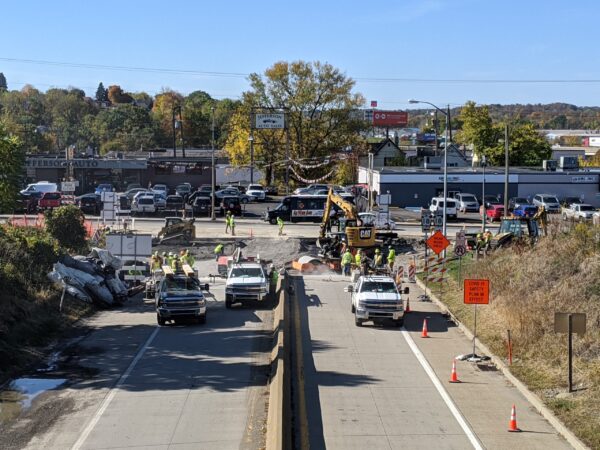
February 26, 2024 | Articles
Continuity, Creativity, and Collaboration: Delivering PennDOT’s Route 18 Signal Upgrade
We and use cookies and other tracking technologies to improve your experience on our website. We may store and/or access information on a device and process personal data, such as your IP address and browsing data, for personalised advertising and content, advertising and content measurement, audience research and services development. Additionally, we may utilize precise geolocation data and identification through device scanning.
Please note that your consent will be valid across all our subdomains. You can change or withdraw your consent at any time by clicking the “Consent Preferences” button at the bottom of your screen. We respect your choices and are committed to providing you with a transparent and secure browsing experience.
| Cookie | Duration | Description |
|---|---|---|
| cookielawinfo-checbox-analytics | 11 months | This cookie is set by GDPR Cookie Consent plugin. The cookie is used to store the user consent for the cookies in the category "Analytics". |
| cookielawinfo-checbox-functional | 11 months | The cookie is set by GDPR cookie consent to record the user consent for the cookies in the category "Functional". |
| cookielawinfo-checbox-others | 11 months | This cookie is set by GDPR Cookie Consent plugin. The cookie is used to store the user consent for the cookies in the category "Other. |
| cookielawinfo-checkbox-necessary | 11 months | This cookie is set by GDPR Cookie Consent plugin. The cookies is used to store the user consent for the cookies in the category "Necessary". |
| cookielawinfo-checkbox-performance | 11 months | This cookie is set by GDPR Cookie Consent plugin. The cookie is used to store the user consent for the cookies in the category "Performance". |
| viewed_cookie_policy | 11 months | The cookie is set by the GDPR Cookie Consent plugin and is used to store whether or not user has consented to the use of cookies. It does not store any personal data. |


